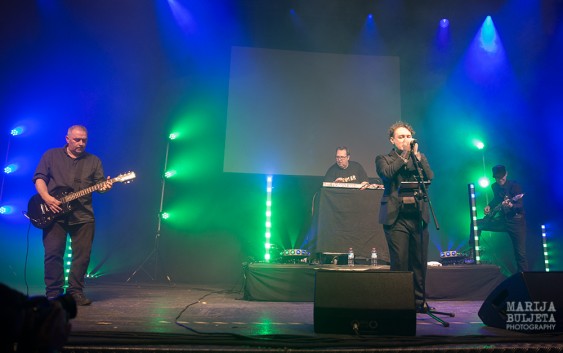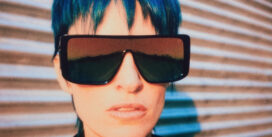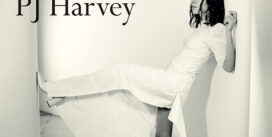It’s been a long ride for The Cassandra Complex since the first album released in 1986 up until now. Only 30 years later, I am having a chat with Rodney Orpheus, who I think needs no further introduction.
1. On your web site you say about Grenade, and I cite “some of it sounds kinda naive over twenty years later“. Is that really how you feel about it? It surly does not sound naive to me, as I am a bit of a retro sound fan; it still has so much to say and I would rather describe it like a brilliant author’s work.
Rodney: Thank you for that. I still really love that album, don’t get me wrong, the songs are great. I wish we had had more sophisticated recording technology and more time and understanding of the process, I guess that’s what I mean by naive. But naive isn’t necessarily a bad thing, it was us being young and frustrated and screaming at the world because we felt we had something important to say and nobody was listening. I guess we still feel that way sometimes 🙂
 2. Hello America consists of some really amazing tracks, and you refer to J. G. Ballard as the release is named after one of his novels. However I did not read that particular novel, so how did you chose that one and was J. G. Ballard influential in general for the band in terms of song writing and music making?
2. Hello America consists of some really amazing tracks, and you refer to J. G. Ballard as the release is named after one of his novels. However I did not read that particular novel, so how did you chose that one and was J. G. Ballard influential in general for the band in terms of song writing and music making?
Rodney: When I was about 14 years old my family went on holiday to the seaside – and it rained the whole time. I was so bored I went to a local bookshop and I saw a book on sale called The Atrocity Exhibition by J.G. Ballard. The title intrigued me so I bought it with the few pennies I had and read it that evening while rain lashed down outside. The book’s investigation into the psychology of sex, violence, the modern world etc. blew my mind and changed me completely. I guess it must have had a similar effect on Ian Curtis because Joy Division used that title for one of their songs.
The album Hello America was originally a compilation of our early singles that we did for our first American record company release, so I thought Hello America would be a perfect title for it.
3. I feel Theomania was more rock sound influenced, so what are your own thoughts about that album?
Rodney: I honestly don’t know about that, it doesn’t sound like normal rock music to me… 🙂 Unlike the first two records which were written before we had any real success, Theomania was written while we were riding high as the darlings of a new breed of electro-rock bands. We didn’t feel like we were just screaming in the dark anymore, and we had a little bit more money to spend, so I wanted to create a record that was more polished and had real depth to it. It was a lot of work and we were touring like crazy at the same time, and the stress actually broke up the lineup of the band. But it’s a wonderful record, probably the best all-round album we’ve ever made.
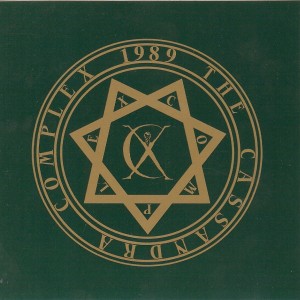
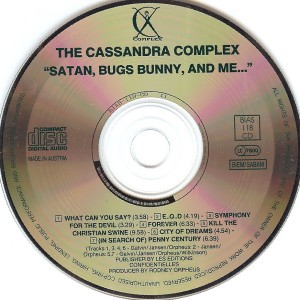 4. There is a quite an interesting story behind Satan, Bugs, Bunny & Me! Some of your lyrics show a lot of political and social awareness and personal views and I feel this album has a very strong message. What’s the story behind it?
4. There is a quite an interesting story behind Satan, Bugs, Bunny & Me! Some of your lyrics show a lot of political and social awareness and personal views and I feel this album has a very strong message. What’s the story behind it?
Rodney: I’m very interested in occultism – I’ve written books about it, and even worked in the world’s biggest magical supply store when I was starting the band. During the time we were making this album there was a huge public witch hunt instigated by right-wing fundamentalist Christians against so-called “Satanists” (i.e. anyone not white, straight, and boring). People I knew were being arrested and their children taken away from them. It was an enormous problem, hard for people these days to believe – but do a Google search for “Satanic Panic” and you’ll see. I was making this album while all this was going on, so it’s a very harsh angry record. I was not in a good place while making it.
5. Although you say you are not happy about the way Cyberpunx was released, it is one damn good album. As I have read about your original idea I must admit it was a very bold one and it kinda made me smile, as the idea for Cyberpunx is really beyond my imagination. So do you still have intention of re-releasing it?
Rodney: Yes. I really want to re-release it in the form it was original envisaged, as a full Science Fiction rock opera. Expect that next year I’d guess. I’d actually like to do it live that way too… we will see. It’s a great record all in all, I really felt like I finally was pushing the band in a much wider direction than before.
6. Is The War Against Sleep a collection of love ballads of some sort?
Rodney: Yes 🙂 I was really, deeply in love at the time, and then the relationship broke up horribly. So that record was one long description about the love story with my ex. I still think those are some of the best songs I’ve ever written. It was a very emotional period – I would leave the studio every night in tears. But that’s good – I wanted to get that sense of loss of love down on to the recording as pure and real as I could, no matter how painful it was.
 7. After The War Against Sleep, The Cassandra Complex seemed to go back to their basics; it is raw and relentless. And a last one before a longer pause for the band. What was going on in between Sex & Death and Wetware?
7. After The War Against Sleep, The Cassandra Complex seemed to go back to their basics; it is raw and relentless. And a last one before a longer pause for the band. What was going on in between Sex & Death and Wetware?
Rodney: When The War Against Sleep came out, the reviews were awful. All the journalists kept saying how we had sold out, were making stupid love songs in order to be commercial and we weren’t being “authentic” anymore. Which really pissed me off, because it was the most authentic and heartfelt record we ever did – and looking back on it now, I know I was right and they were wrong. But I was really frustrated about that at the time. Also by this time a whole bunch of “industrial” bands had come up who were basically ripping us off and I felt that we were not getting the credit we deserved. So someone said “you need to get back to basics” and I thought “well, what does that mean exactly? What are the most basic things?”. And the answer was obvious when I put it like that: Sex & Death. So I spent a lot of time in BDSM clubs in Hamburg exploring that realisation 😉
After we made Sex & Death I felt I need to have a change in my life. I’d been living in Hamburg for the previous few years and I needed to get away, so I moved to Los Angeles, and that’s where I started working on Wetware.
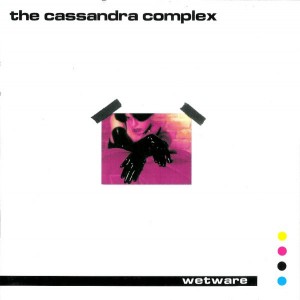 8. What are your own thoughts on Wetware? How was Wetware received by your fans and critics as the new CC release in a new millennium?
8. What are your own thoughts on Wetware? How was Wetware received by your fans and critics as the new CC release in a new millennium?
Rodney: The good thing about taking the time off and moving to someplace completely new was that it meant I could see myself and my life from another perspective. I was able to step back from all my previous work and look at it from the outside. And so Wetware was me saying “Aha! I finally understand myself and what I’ve been trying to do all this time”. And so that record in a way sounds almost like it could be a Greatest Hits album, even though all the songs were new, to me it felt like it was all the stuff we had been trying to do beforehand collapsed into one record.
9. I won’t ask about your musical influences, as you are a musical influence in your own right and have been inspiring others for some 30 years. How do you feel as a band who has such an important role when it comes to “dark” and alternative music scene?
Rodney: I honestly don’t know how to answer that. I’m actually quite a fumble person when it comes to those sort of things – even now when someone tells me they love my music I feel really surprised by that. But that’s a good thing I guess. When Andy and I formed the band we never really set out to be a great influence, we just knew we had a sound and a message inside us that needed to become real because no-one else was really doing it.
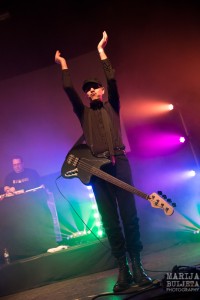
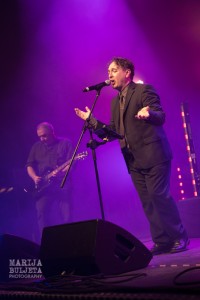 10. You have been in the music business for this long, and you have surely tasted some indeed happy but bitter moments as well, as I feel the industry is not at all the kindest. How did you cope with difficulties along the way of your artistic creating and can you say the reward of being recognized as a legendary name made the pains into joys of your life?
10. You have been in the music business for this long, and you have surely tasted some indeed happy but bitter moments as well, as I feel the industry is not at all the kindest. How did you cope with difficulties along the way of your artistic creating and can you say the reward of being recognized as a legendary name made the pains into joys of your life?
Rodney: Wow, tough question. But good question. Yes, the life of an artist is not an easy one at times. But I love what I do. I’ve been able to travel the world, meet wonderful people, and (hopefully) change their lives. And create amazing new things. That more than makes up for the bullshit other stuff that I’ve had to deal with along the way. But really this is a question I could spend several hours discussing 🙂
11. You are a brilliant song writer, reflecting upon the society, politics, religious views, arts and personal emotions, with lots of imagination as well. How much do you feel that aspect of your work is a way of sending a message, sharing a view with your audience, means of provoking, making others think?
Rodney: Yes, of course. I remember some musician backstage once saying to me “It’s only rock and roll, it’s not about changing the world”. Fuck that! For me it is about changing the world! I’m not interested in making music to be “famous” (whatever that even means), or to make money (I’d make more money working in a bank), or for “entertainment”. Unless I am changing people’s lives I feel like I am wasting my time. That’s why I’m always creating something new, whether it’s producing records, writing books, making software, whatever. I feel that if I’m not making a better world, then I’m wasting my time.
 12. On stage you are no less of a showman with a lot of good vibe, resonating intimately with the crowd; so after so many live performances, I feel you still share the same enthusiasm on stage. How is it for you? Has something changed over the years or you still feel the same passion?
12. On stage you are no less of a showman with a lot of good vibe, resonating intimately with the crowd; so after so many live performances, I feel you still share the same enthusiasm on stage. How is it for you? Has something changed over the years or you still feel the same passion?
Rodney: I remember our first tour manager saying to me “Well, you feel like that now on your first tour, but after six months you will be like everyone else” and I swore then I would never, ever be like that. Every time I get on that stage it needs to be just as wonderful and exciting and amazing as the very first time. Unfortunately that also means it’s just as scary as the first time. Even after all this time I’m sooooo nervous before a show 🙂
13. At E-tropolis Festival 2016, The Cassandra Complex was the highlight of the day for me. How are you satisfied with this recent live experience?
Rodney: Very much so. After 30 years I genuinely feel that we are better now than we ever have been. But we want to be even better, so still working on that 🙂
14. We can see you again very soon at M’era Luna festival 2016. How do you feel about festival shows opposed to playing in smaller venues?
Rodney: We all have other careers – Andy is a successful music business lawyer, I design music and video software and write books, Axel is a live sound engineer etc. So our time for touring is very limited. That means playing festivals is the best way to get to the biggest number of people in the shortest amount of time. But the drawback is the short amount of time we have to play – we have so many great songs that we never get the chance for people to hear. When we play club shows we normally play for 90 minutes to 2 hours, and that’s really satisfying. We hope to be able to do more of those later this year, or next year.
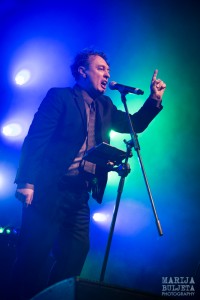 15. Can you share some thoughts on the current music industry situation in the time when everything is easily available on Spotify, Soundcloud, Bandcamp…? You started in some very different times. Even with the opportunities of reaching the listeners easier, a lot of emerging names struggle to get recognized and of course as new technologies made it easier for musicians, do you feel the whole thing made the scene poorer in some ways?
15. Can you share some thoughts on the current music industry situation in the time when everything is easily available on Spotify, Soundcloud, Bandcamp…? You started in some very different times. Even with the opportunities of reaching the listeners easier, a lot of emerging names struggle to get recognized and of course as new technologies made it easier for musicians, do you feel the whole thing made the scene poorer in some ways?
Rodney: It’s made musicians poorer in one way for sure: less money. The average Spotify or YouTube user is worth less than one dollar a year. That’s one dollar shared with all the musicians in the world. When we started it was quite possible to make a decent living as an independent band, if you were clever and worked hard. But these days that’s almost impossible unless you sign your soul away to a major label. And even then it’s almost impossible to make that into a career with any longevity.
Also I think most modern musicians, even so-called “alternative” ones aren’t making music that is genuinely challenging and meaningful. Too often it’s just people going through the motions of sounding a bit like their heroes instead of having a real message to transmit. I don’t hear many songs about politics anymore. In fact I don’t hear many songs about anything important any more.
16. Can you draw some lines between young Rodney some 20-30 years ago and Rodney in his best years? Do you still share the same views on life and music? Has time and experience changed something for you and your passion for music?
Rodney: I would hope I’m a bit wiser now. And I would hope I’m still in my “best years” 🙂
But generally I don’t feel a lot different than when I was in my 20s. Really. I think I know myself a lot better and understand why I am the person I am. But I’m still that same person, with the same love of the wonderment of life, and the same anger at injustice and stupidity.
17. What is Rodney doing when he is not on stage? Any plans regarding some new materials?
Rodney: I do a lot of things. I’m currently working with Kevin Godley, the famous video director, and I just designed some software called Youdio that people can use to make music videos (go download it!). I also spend a lot of time playing games – I’ve loved games since I was a child and I have designed some too. Currently spending way too much time running a Guild in The Elder Scrolls Online (gamers, look me up on Steam: rodney418). And yes, making music. We have about 20 songs written for the next album by The Cassandra Complex, I just need to finish recording them all…


